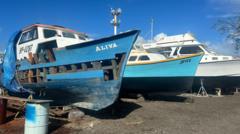The fishing industry in Barbados is still grappling with the effects of Hurricane Beryl, which devastated the island in July and severely damaged its fishing fleet. As many as 75% of active fishing vessels suffered damage, leading to significant financial hardship for local fishermen. While some boats have been salvaged and restored, the storm's impact is still strongly felt in the community, with many livelihoods hanging by a thread.
In Bridgetown, temporary boatyards showcase boats with broken hulls and shattered windows, a stark reminder of the storm's fury. Fisherman Charles Carter describes the immense emotional and financial toll, having invested thousands in repairs. "That's my living, my livelihood, fishing is all I do," he states with a palpable sense of loss.
Significantly, Hurricane Beryl is seen as a harbinger of escalating climate-related risks in the Caribbean. Dr. Shelly Ann Cox, Barbados' Chief Fisheries Officer, notes changing sea conditions and warmer temperatures complicating traditional practices. Fishermen experience difficulties catching flying fish, a crucial part of local cuisine and economy. "Everything has changed. The tides are changing, the weather is changing," reflects fisherman Cornelius Carrington.
The implications of these changes reverberate beyond fishing. The tourism industry also suffers, as hotels and restaurants struggle to procure enough seafood to meet consumer demand. Discussions around climate education highlight a growing recognition in young Barbadians of their precarious situation, as they express mixed feelings about their ability to effect change in the face of global pollution.
Prime Minister Mia Mottley has positioned herself as a vocal advocate for urgent climate action on the international stage, promising to push for reparations from industrialized nations for the ongoing threats to island nations. Meanwhile, local fishermen like Steven Bourne, who also lost boats in the hurricane, continue to confront the continuous erosion of their coastal communities.
Reflecting on the past and the changing landscape, Home Affairs Minister Wilfred Abrahams acknowledges a new normal for Caribbean hurricane seasons, prompting extensive reevaluations of disaster preparedness plans. "What we can expect has changed…what our culture is built around has changed," he notes.
With the future of their industry and way of life at stake, Barbados' fishing community remains both resilient and apprehensive, mourning losses and preparing for the unpredictable challenges that climate change brings to their shores.


















